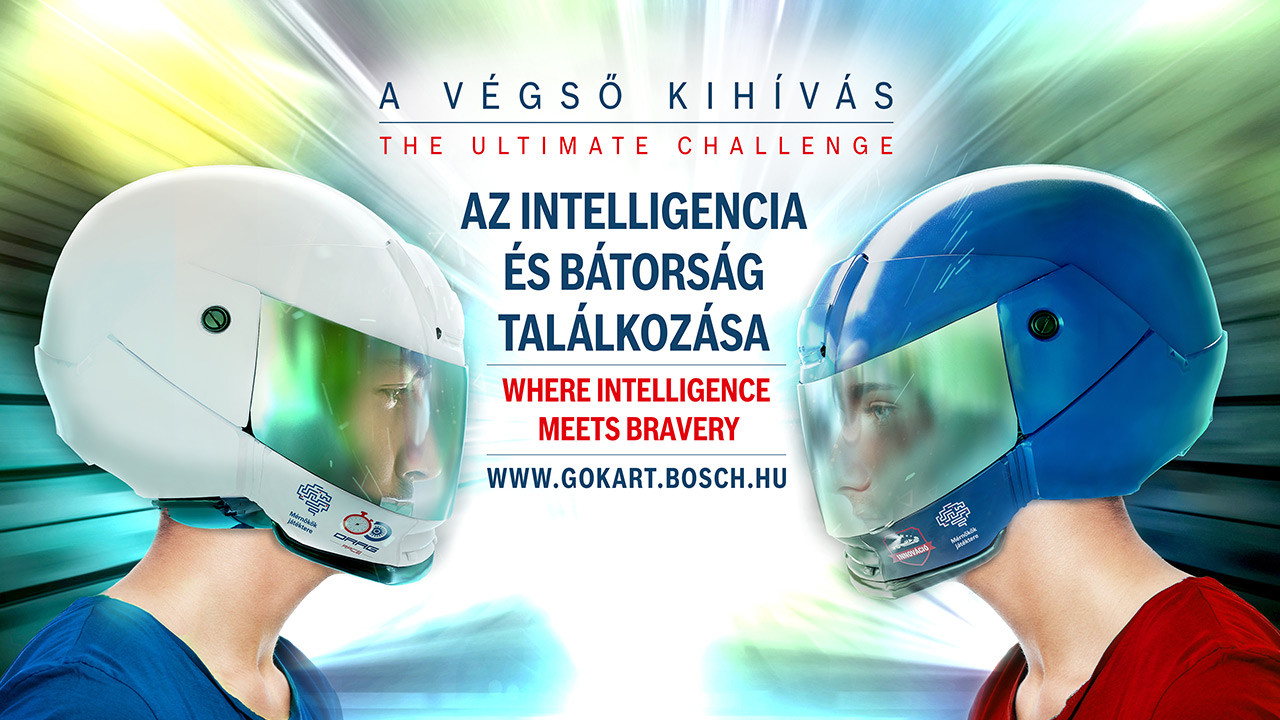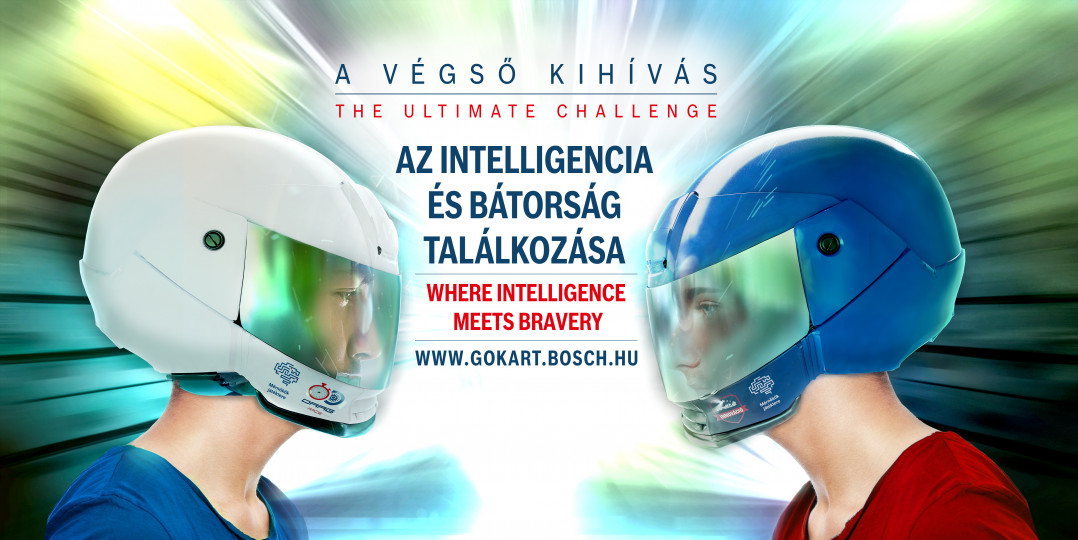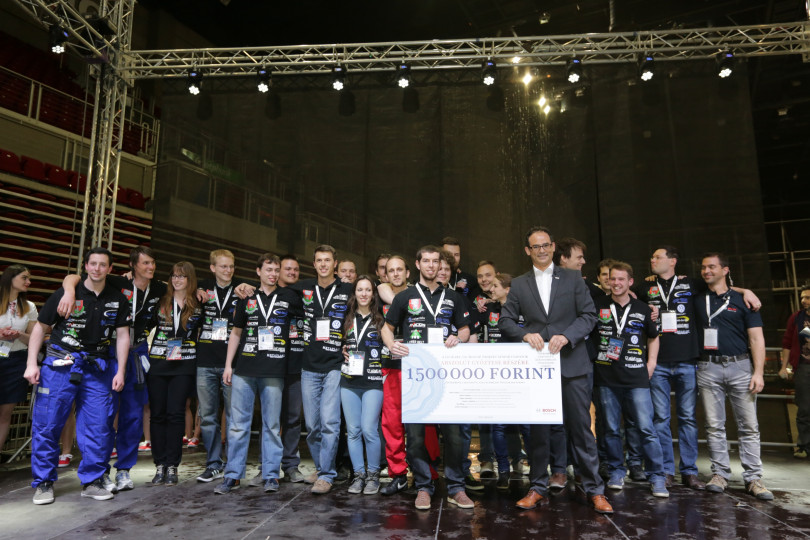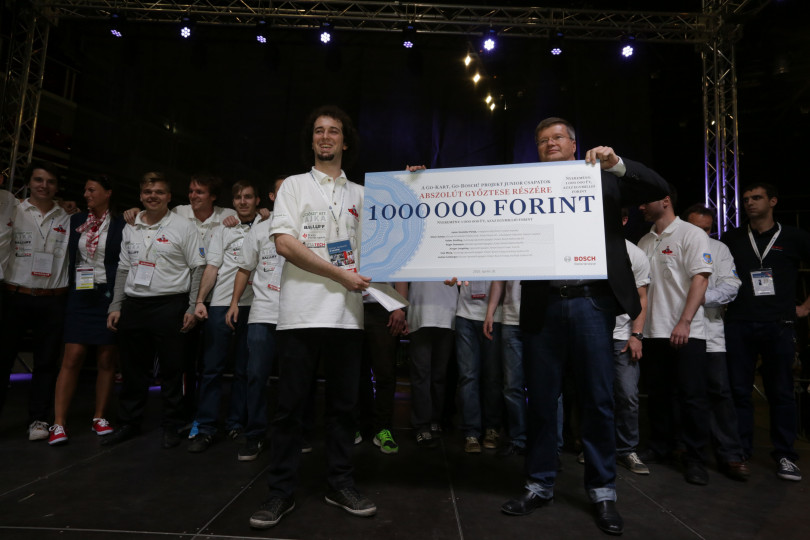Sensation and innovation, intelligence and courage – all these will come together when ten determined teams meet up at the Bosch campus on 23 April. In the same way that juvenile go-karters can end up in Formula 1, the young talents constructing autonomous go-karts today will eventually be working on real autonomous cars. So the future will be on show at the final event of the third and closing season of Go-Kart, Go-Bosch!. Proven teams of students will be lining up for the final challenge in three categories. Go-karts in the efficiency category will have hybrid power trains, regenerative braking and a rear differential. In the intelligent category, go-karts have to be capable of parking automatically and following a learned route to a designated parking space. These smart vehicles will automatically keep to the right lane and apply the emergency brake if they meet an obstacle. But that’s not all. By joining up these two driver assistance systems, they have to have adaptive cruise control so that the go-kart will keep a set speed and a constant distance from the vehicle in front, while keeping to its own lane. Featuring all this and more are entries in the top category – autonomous go-karts. That is where contestants face some really serious tasks. As well as automatically navigating to the destination, the go-karts have to perform a set of traffic procedures using driver assistance systems based on sensors and external signals.
Javier González Pareja, representative of the Bosch Group in Hungary, said that the teams were putting the automotive functionality of the future into their go-karts. “And they have to do it as imaginatively and professionally as possible. Bosch places great importance on making the engineering career attractive to young people. The creative programme of the Go-Kart, Go-Bosch! event puts life into the profession. The students like it, and we like it too. We will find out which university or college has the best prepared, most persistent and most tech-savvy students.” The main aim of the Go-Kart, Go-Bosch! events is to promote the engineering profession and practical-based training, showing why it is good to be an engineer.
Hybrid and autonomous
Bosch provided each team with one go-kart for the contest, together with mandatory construction components: a starter motor and two electric motors from rechargeable lawnmowers. Their task was to use these in combination with the go-kart’s factory engine to implement a hybrid drive. Using a cordless drill, the teams have had to design and build a starter for the go-kart’s petrol engine. Another task is to use radars and cameras to implement automatic emergency braking, lane keeping and adaptive cruise control functions on their go-karts. Bosch has also provided technical support. The contestants have produced autonomous go-karts with innovative designs.
Engineers’ playground
For the final challenge, ten teams will be pitting their skills from eight universities and colleges (Budapest University of Technology and Economics – BME Gokart Team; Kecskemét College – GAMFkart; University of Miskolc – ME-KART;
University of Nyíregyháza – FORZA NYF KART; Óbuda University – G-OE-KART; Óbuda University – Safety Kart; University of Pannonia – Pannon-Racing; University of Pécs – Sopianae Motorsport; Szent István University – G.B.G. Team; Szent István University – SZIe-Kart). In addition to the excitement of the competition, there will be entertainment – go-karting, drifting, a tech-based team escape game, and a chance to look behind the scenes in Bosch and see what a high-tech workplace is like. The event starts at 9 am on 23 April, and entry is free.
Mónika Hack
+36 70 510 5516
Bosch has been present in Hungary since 1899. After its re-establishment as a regional trading company in 1991, Bosch has grown into one of Hungary’s largest foreign industrial employers. In financial 2014, its 9 Hungarian subsidiaries had a total turnover of HUF 825 billion and sales of the Bosch Group on the Hungarian market – not counting trade among its own companies – was HUF 183 billion The Bosch Group in Hungary employs 10,500 people (as per April 1, 2015). In addition to its manufacturing, commercial and development business, Bosch has a network of sales and service operations that covers the entire country.
The Bosch Group is a leading global supplier of technology and services. It employs roughly 375,000 associates worldwide (as of December 31, 2015). According to preliminary figures, the company generated sales of more than 70 billion euros in 2015. Its operations are divided into four business sectors: Mobility Solutions, Industrial Technology, Consumer Goods, and Energy and Building Technology. The Bosch Group comprises Robert Bosch GmbH and its roughly 440 subsidiary and regional companies in some 60 countries. If its sales and service partners are included, then Bosch is represented in roughly 150 countries. This worldwide development, manufacturing, and sales network is the foundation for further growth. In 2015, Bosch applied for some 5,400 patents worldwide. The Bosch Group’s strategic objective is to deliver innovations for a connected life. Bosch improves quality of life worldwide with products and services that are innovative and spark enthusiasm. In short, Bosch creates technology that is “Invented for life.”
Additional information is available online at www.bosch.hu







